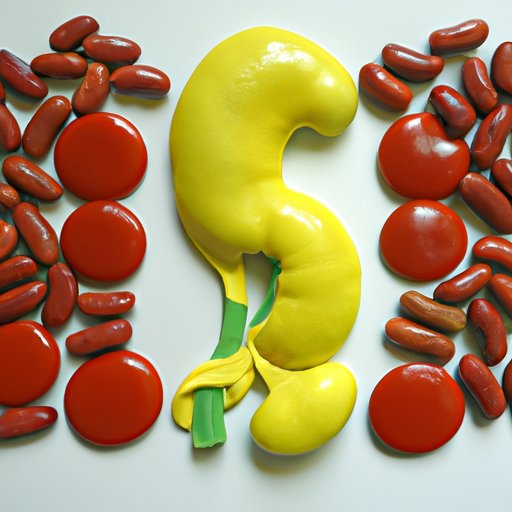
Introduction
Kidney disease is a chronic condition characterized by the gradual loss of kidney function over time. According to the National Kidney Foundation, kidney disease affects more than 37 million people in the United States alone. Reversing kidney disease can be challenging, but with the right tips, treatments, and lifestyle changes, it is possible to slow down or even reverse the progression of this condition. In this article, we will explore the ultimate guide to reversing kidney disease.
The Ultimate Guide to Reversing Kidney Disease: Tips, Treatments, and Lifestyle Changes
The importance of treating kidney disease early
Early detection and treatment are crucial in reversing kidney disease. If left untreated, kidney disease can lead to kidney failure, which requires dialysis or a kidney transplant to survive. Therefore, it is essential to identify the symptoms of kidney disease early on and seek medical attention as soon as possible.
Tips and tricks to improve kidney function
There are several tips and tricks to improve kidney function, such as staying hydrated, avoiding excessively salty foods, and keeping your blood pressure under control. Additionally, it is essential to avoid over-the-counter medications, such as ibuprofen, which can damage the kidneys over time.
Medications for reversing kidney disease
Some medications can help slow the progression of kidney disease by lowering blood pressure and reducing proteinuria (excess protein in the urine). ACE inhibitors and angiotensin II receptor blockers (ARBs) are two commonly prescribed medications for kidney disease.
Lifestyle changes for a healthier kidney
Lifestyle changes are key to improving kidney function and reversing kidney disease. Quitting smoking, reducing alcohol consumption, and maintaining a healthy weight are all essential steps to take. Additionally, regular exercise and stress reduction techniques, such as meditation, can also improve kidney health.
10 Natural Remedies for Reversing Kidney Disease
The importance of natural remedies
Natural remedies can be a complementary approach to improving kidney function and reversing kidney disease. They can help reduce inflammation, lower blood pressure, and improve overall kidney health.
Natural remedies for improving kidney function
There are several natural remedies for improving kidney function, such as consuming foods high in antioxidants, including berries, red grapes, and bell peppers. Additionally, herbs such as turmeric and ginger can also be beneficial for kidney health.
How to use these remedies for maximum benefit
It is essential to note that natural remedies can have interactions with certain medications or medical conditions. Always consult with your physician before incorporating any new natural remedies into your routine.
The Do’s and Don’ts of a Kidney-Friendly Diet
The importance of a kidney-friendly diet
A kidney-friendly diet is essential for maintaining healthy kidneys. It is essential to avoid high-sodium foods and limit the intake of protein, as these can increase the workload on the kidneys and exacerbate kidney disease.
Foods to avoid for healthy kidneys
Foods to avoid for healthy kidneys include processed foods, candy, and sugary drinks. Additionally, high-potassium foods, such as bananas and potatoes, should be consumed in moderation.
Best foods for a kidney-friendly diet
Best foods for a kidney-friendly diet include fresh fruits and vegetables, whole grains, and lean protein sources, such as fish and tofu. Additionally, it is essential to stay hydrated throughout the day with water or other low-sugar, low-potassium beverages.
How Exercise Can Help Reverse Kidney Disease: A Beginner’s Guide
How exercise can benefit kidney function
Regular exercise can improve kidney function by lowering blood pressure, reducing inflammation, and improving overall cardiovascular health. Exercise can also help reduce stress, which can be beneficial for individuals with kidney disease.
Exercises for individuals with kidney disease
Individuals with kidney disease should consult with their physician before starting an exercise routine. Low-impact exercises, such as walking, swimming, and cycling, are generally safe for individuals with kidney disease and can provide significant health benefits.
Strategies for incorporating exercise into your daily routine
Incorporating exercise into your daily routine can be challenging, but small changes can make a big difference. Try taking a short walk after dinner or incorporating a few minutes of stretching into your morning routine. Over time, increase the duration and intensity of your exercise routine.
Understanding the Role of Medications in Reversing Kidney Disease: Pros and Cons
Overview of medications used to treat kidney disease
There are several medications used to treat kidney disease, such as ACE inhibitors, angiotensin II receptor blockers (ARBs), and diuretics. These medications can help improve kidney function and slow the progression of kidney disease.
Common side effects of medication
Common side effects of kidney disease medications include dizziness, fatigue, and coughing. Additionally, some medications can interact with other medications or medical conditions, so it is essential to discuss potential side effects with your physician.
The risks and benefits of using medication to treat kidney disease
Using medications to treat kidney disease can slow the progression of the disease and improve overall kidney function. However, medications also come with potential side effects, so it is essential to weigh the risks and benefits of using medication with your physician.
Conclusion
Reversing kidney disease can be a challenging journey, but with the right tips, treatments, and lifestyle changes, it is possible to improve kidney function and slow down the progression of the disease. Incorporating natural remedies, following a kidney-friendly diet, exercising regularly, and discussing potential medications with your physician can all be beneficial in reversing kidney disease. Remember to stay positive, take the necessary steps to improve kidney function, and never hesitate to seek medical attention when needed.




